Although Modern Societies Have a Strong Emphasis on Science Religion Continues Because Science
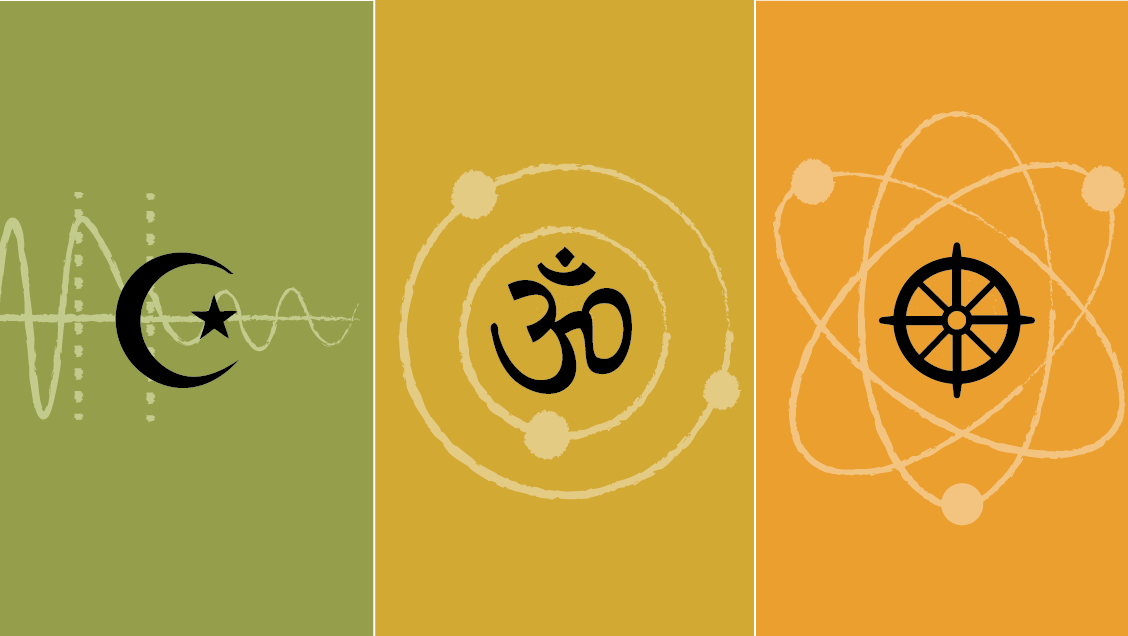
On the Intersection of Science and Religion
Over the centuries, the relationship between science and religion has ranged from conflict and hostility to harmony and collaboration, while various thinkers have argued that the two concepts are inherently at odds and entirely separate.
But much recent research and discussion on these issues has taken place in a Western context, primarily through a Christian lens. To better understand the ways in which science relates to religion around the world, Pew Research Center engaged a small group of Muslims, Hindus and Buddhists to talk about their perspectives. These one-on-one, in-depth interviews took place in Malaysia and Singapore – two Southeast Asian nations that have made sizable investments in scientific research and development in recent years and that are home to religiously diverse populations.
The discussions reinforced the conclusion that there is no single, universally held view of the relationship between science and religion, but they also identified some common patterns and themes within each of the three religious groups. For example, many Muslims expressed the view that Islam and science are basically compatible, while, at the same time, acknowledging some areas of friction – such as the theory of evolution conflicting with religious beliefs about the origins and development of human life on Earth. Evolution also has been a point of discord between religion and science in the West.
Hindu interviewees generally took a different tack, describing science and religion as overlapping spheres. As was the case with Muslim interviewees, many Hindus maintained that their religion contains elements of science, and that Hinduism long ago identified concepts that were later illuminated by science – mentioning, for example, the antimicrobial properties of copper or the health benefits of turmeric. In contrast with Muslims, many Hindus said the theory of evolution is encompassed in their religious teachings.
Buddhist interviewees generally described religion and science as two separate and unrelated spheres. Several of the Buddhists talked about their religion as offering guidance on how to live a moral life, while describing science as observable phenomena. Often, they could not name any areas of scientific research that concerned them for religious reasons. Nor did Buddhist interviewees see the theory of evolution as a point of conflict with their religion. Some said they didn't think their religion addressed the origins of life on Earth.

Some members of all three religious groups, however, did express religious concerns when asked to consider specific kinds of biotechnology research, such as gene editing to change a baby's genetic characteristics and efforts to clone animals. For example, Muslim interviewees said cloning would tamper with the power of God, and God should be the only one to create living things. When Hindus and Buddhists discussed gene editing and cloning, some, though not all, voiced concern that these scientific developments might interfere with karma or reincarnation.
But religion was not always the foremost topic that came to mind when people thought about science. In response to questions about government investment in scientific research, interviewees generally spoke of the role of scientific achievements in national prestige and economic development; religious differences faded into the background.
These are some of the key findings from a qualitative analysis of 72 individual interviews with Muslims, Hindus and Buddhists conducted in Malaysia and Singapore between June 17 and Aug. 8, 2019.
The study included 24 people in each of three religious groups (Muslims, Hindus and Buddhists), with an equal number in each country. All interviewees said their religion was "very" or "somewhat" important to their lives, but they otherwise varied in terms of age, gender, profession and education level.
A majority of Malaysians are Muslim, and the country has experienced natural migration patterns over the years. As a result, Buddhist interviewees in Malaysia were typically of Chinese descent, Hindus were of Indian descent and Muslim interviewees were Malay. Singapore is known for its religious diversity; a 2014 Pew Research Center analysis found the city-state to have the highest level of religious diversity in the world.
Insights from these qualitative interviews are inherently limited in that they are based on small convenience samples of individuals and are not representative of religious groups either in their country or globally. Instead, in-depth interviews provide insight into how individuals describe their beliefs, in their own words, and the connections they see (or don't see) with science. To help guard against putting too much weight on any single individual's comments, all interviews were coded into themes, following a systematic procedure. Where possible throughout the rest of this report, these findings are shown in comparison with quantitative surveys conducted with representative samples of adults in global publics to help address questions about the extent to which certain viewpoints are widely held among members of each religious group. This also shows how Muslims, Hindus and Buddhists as well as Christians around the world compare with each other.
The goal of this project was to better understand how people think about science in connection with their religious beliefs. Past research on this topic has often focused on the views of Christians living in the U.S. or other economically advanced nations. This study sought to fill that gap by talking, one-on-one, with Muslims, Hindus and Buddhists living in two growing economies in Southeast Asia: Malaysia and Singapore. Pew Research Center conducted qualitative interviews with 72 people, including 24 in each of the three religious groups (12 in each country).
To be eligible for the study, interviewees had to identify their religious affiliation as Muslim, Hindu or Buddhist, and describe religion as either "very" or "somewhat" important in their lives. They varied in other demographic characteristics, including age, gender, ethnicity, profession, employment status and educational attainment.
Interviews were conducted by Ipsos Qualitative with a local, professional interviewer, using a guide developed by Pew Research Center. Interviews lasted about one hour and were conducted in English in Singapore, and in English or Malay in Malaysia. The Singaporean interviews were conducted June 17 to July 26, 2019, and the Malaysian interviews were done July 31 to Aug. 8, 2019.
Center researchers listened to audio recordings of the interviews and systematically coded transcripts for thematic responses, using qualitative data analysis software. Themes were revised and integrated throughout the coding process, until researchers agreed upon a consistent set of categories. The qualitative interviews are based on small, convenience samples of individuals and are not representative of religious groups in either country. Whenever possible, these findings are shown in comparison with quantitative data from global surveys using representative samples of adults who identify as Muslim, Hindu, Buddhist or Christian. You can find the interview guide here.

Interviewees paint three distinct portraits of the science-religion relationship
One of the most striking takeaways from interviews conducted with Muslims, Hindus and Buddhists stems from the different ways that people in each group described their perspectives on the relationship between science and religion. The Muslims interviewed tended to speak of an overlap between their religion and science, and some raised areas of tension between the two. Hindu interviewees, by and large, described science and religion as overlapping but compatible spheres. By contrast, Buddhist interviewees described science and religion as parallel concepts, with no particular touchpoints between the two.
A similar pattern emerged when interviewees were asked about possible topics that should be off limits to scientific research for religious reasons. Many Muslim interviewees readily named research areas that concerned them, such as studies using non-halal substances or some applications of assisted reproductive technology (for example, in vitro fertilization using genetic material from someone other than a married couple). By contrast, the Hindus and Buddhists in the study did not regularly name any research topics that they felt should be off limits to scientists.
Muslim interviewees say science and religion are related, but they vary in how they see the nature of that relationship
On the relationship between science and Islam
"I don't see any conflicts [between science and religion]. From what I know in the Quran, they say that there is science in Islam. They talk about the sun, the moon, the stars. They talk about how the water can go up to the sky and become the clouds. When it's heavy, it goes down to the Earth where it's taken by the plants when it evaporates up again. It's part of science."
– Muslim man, age 35, Singapore
"I know that sometimes science and religion don't tally. … As a person of religion, we tend to believe what our book says. Yeah, I believe what the Quran says, [rather] than scientific proof."
– Muslim woman, age 40, Singapore
Muslims frequently described science and their religion as related, rather than separate, concepts. They often said that their holy text, the Quran, contains many elements of science. The Muslims interviewed also said that Islam and science are often trying to describe similar things. "The research in science are related to the Quran. There are similarities between religion and what is explained by science," said one Muslim woman (age 25, Malaysia).
The Muslims interviewed offered a wide variety of opinions about the nature of the relationship between science and religion, and whether the two are harmonious or conflicting. Some described science and Islam as compatible overall. For example, one Muslim man said that both science and his religion explain the same things, just from different perspectives: "I think there is not any conflict between them. … In my opinion, I still believe that it happens because of God, just that the science will help to explain the details about why it is happening" (age 24, Malaysia). Others qualified their statement by saying that science is compatible with religion, but the actions of individual scientists can be problematic. "Actually, science and religion don't conflict with each other – it's humans' opinions that conflict," said one interviewee (Muslim man, age 36, Malaysia).
I think there is not any conflict between them. … In my opinion, I still believe that it happens because of God, just that the science will help to explain the details about why it is happening.
— Muslim man, 24, Malaysia
Still others described the relationship as conflictual. "I feel like, sometimes, or most of the time, they are against each other. … Science is about experimenting, researching, finding new things, or exploring different possibilities. But then, religion is very fixed, to me," said one Muslim woman (age 20, Singapore). Another interviewee said scientists typically do not consider the views of religious people when conducting their research. "Scientists, whatever they do, they don't ask for opinions from people well-versed in religious matters," said another Muslim woman (age 39, Malaysia).
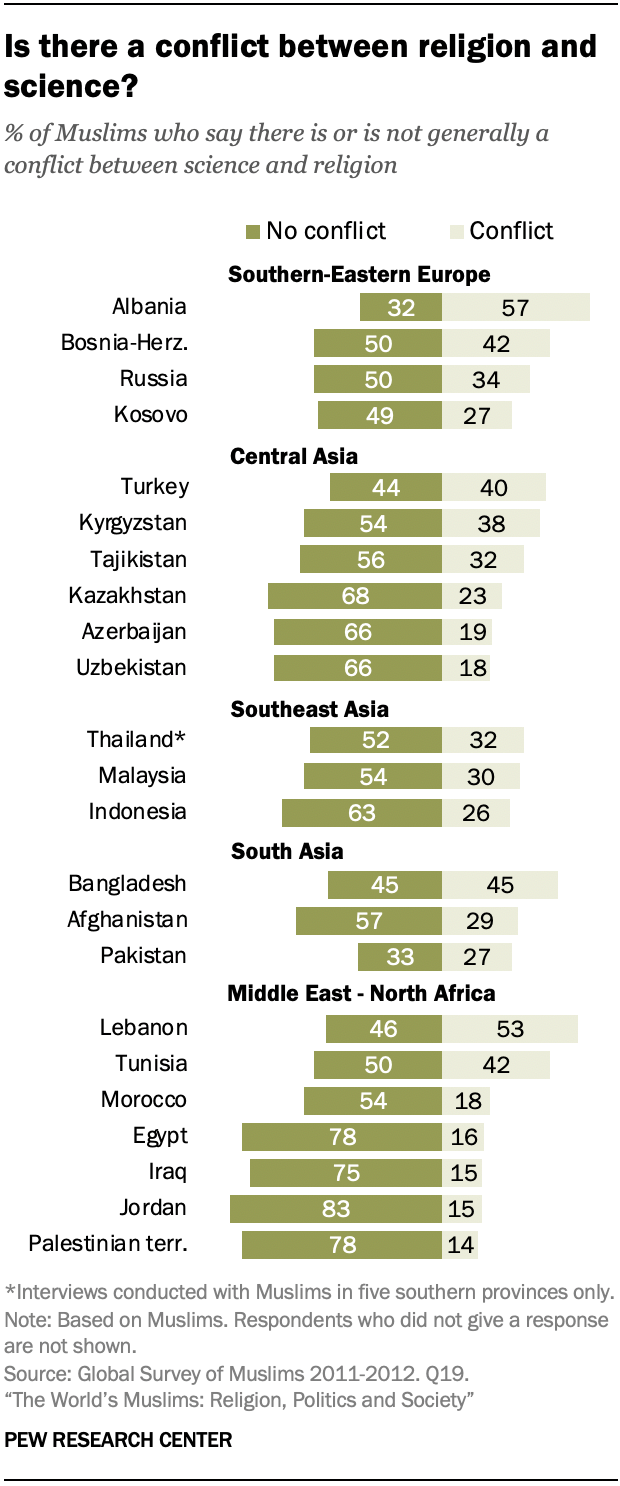
When asked, many of the Muslims interviewed identified specific areas of scientific research that bothered them on religious grounds. Some of the areas mentioned by multiple interviewees included research that uses non-halal substances (such as marijuana, alcohol or pigs), some pregnancy technologies that they considered unnatural (for example, "test tube babies" or procedures that use genetic material not taken from a husband and wife) or cloning.
Representative surveys of Muslims in countries around the world find variation in the share of Muslims who see any conflict between science and religion, although this share is less than half in most countries surveyed. The 2018 Wellcome Global Monitor asked respondents if "science has ever disagreed with the teachings of your religion." Across 51 countries that have large enough samples of Muslims that their views can be broken out separately and analyzed, a common response is that science has "never disagreed" with Islamic religious teachings.1

Similarly, a Pew Research Center survey conducted in 2011 and 2012 that examined the views of Muslims found that, in most regions, half or more said there was no conflict between religion and science, including 54% in Malaysia (Muslims in Singapore were not surveyed). Three-in-ten Malaysian Muslims said there is a conflict between science and religion; the share of Muslims around the world who took this position ranged from a high of 57% in Albania to a low of 14% in the Palestinian territories.
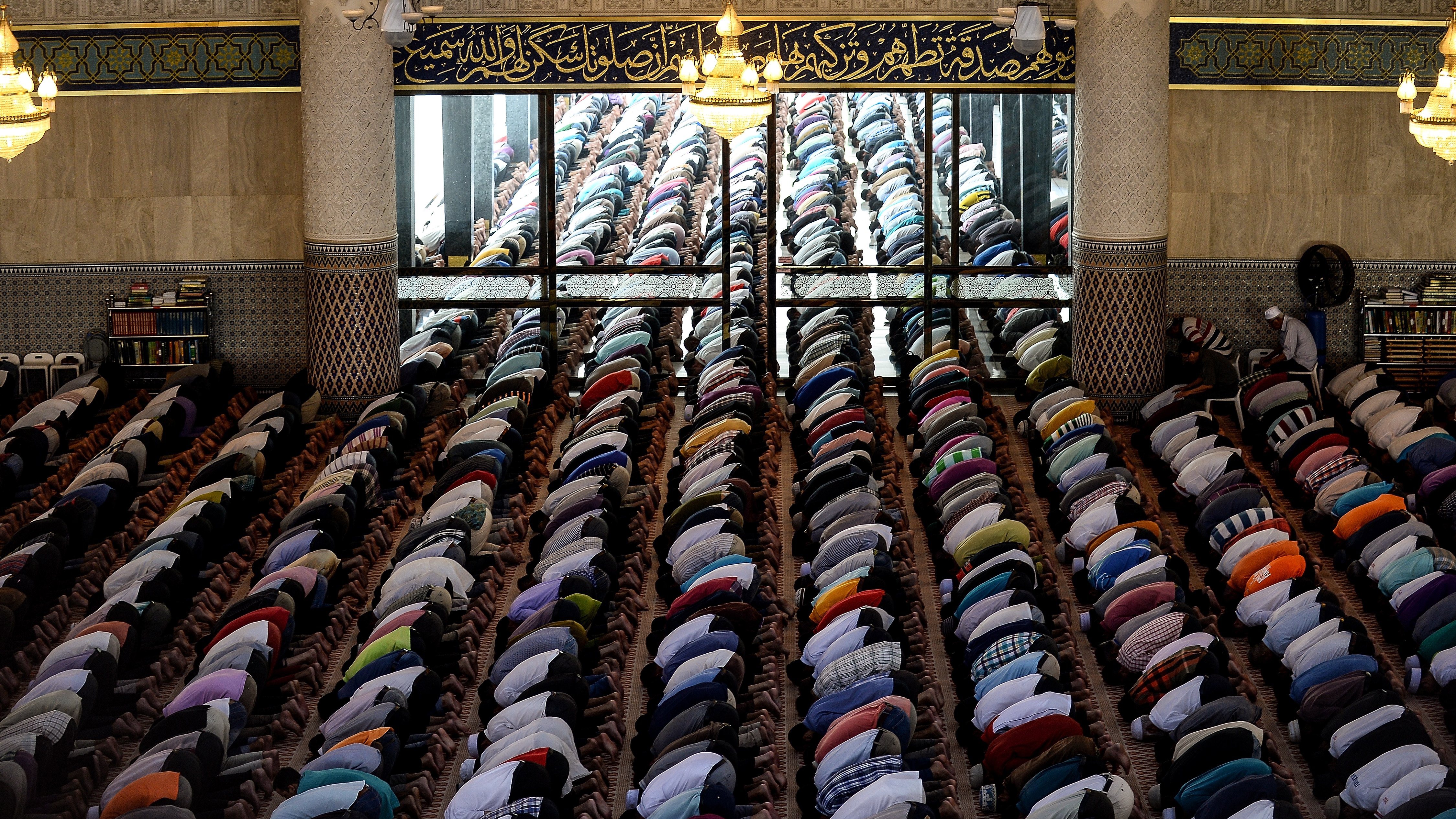
Hindu interviewees generally see science and religion as compatibly overlapping spheres
The predominant view among Hindus interviewed in Malaysia and Singapore is that science and Hinduism are related and compatible. Many of the Hindu interviewees offered – without prompting– the assertion that their religion contains many ancient insights that have been upheld by modern science. For instance, multiple interviewees described the use of turmeric in cleansing solutions, or the use of copper in drinking mugs. They said Hindus have known for thousands of years that these materials provide health benefits, but that scientists have only confirmed relatively recently that it's because turmeric and copper have antimicrobial properties. "When you question certain rituals or rites in Hinduism, there's also a relatively scientific explanation to it," said a Hindu woman (age 29, Singapore).
On the relationship between science and Hinduism
"I believe that whatever science says, the purpose has already been told in my religion. For example, it is said that drinking water from a copper container is very good. This has been proven by the ancestors many years ago. But now only these scientific people come out and say that it is good to use it."
– Hindu woman, age 29, Malaysia
"No, feel free to go ahead and [research] everything. Why would you need to restrict yourself from information or knowledge? Because Hinduism is based on knowledge. It's called 'Nyaya.' That's 'knowledge,' literally translated."
– Hindu man, age 38, Singapore
While many of the Hindu interviewees said science and religion overlap, others described the two as separate realms. "Religion doesn't really govern science, and it shouldn't. Science should just be science. … Today, the researchers, even if they are religious, the research is your duty. The duty and religion are different," said one Hindu man (age 42, Singapore).
Asked to think about areas of scientific research that might raise concerns or that should not be pursued for religious reasons, Hindu interviewees generally came up blank, saying they couldn't think of any such areas. A few mentioned areas of research that concerned them, but no topic area came up consistently.
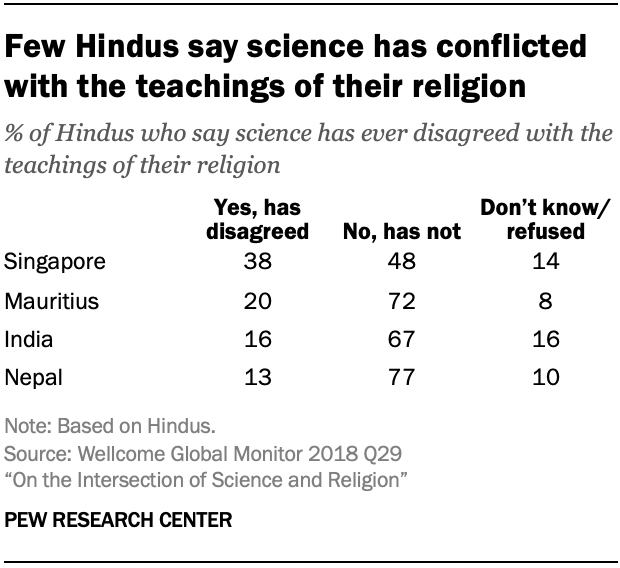
The sense that Hindus generally see little conflict with science aligns with survey findings to date. In three of the four countries in the 2018 Wellcome Global Monitor with large enough samples of Hindus for analysis, majorities said that science had "never disagreed" with the teachings of their religion, including two-thirds of Hindus in India – which is home to the vast majority of the world's Hindus. In Singapore, however, Hindus expressed more ambivalence: About half (48%) said science has not disagreed with the teachings of Hinduism, while nearly four-in-ten (38%) said that it has.2
Buddhist interviewees see science and religion as operating in parallel domains
Buddhist interviewees described science and religion in distinctly different ways than either Muslims or Hindus. For the most part, Buddhists said that science and religion are two unrelated domains. Some have long held that Buddhism and its practice are aligned with the empirically driven observations in the scientific method; connections between Buddhism and science have been bolstered by neuroscience research into the effects of Buddhist meditation at the core of the mindfulness movement.
On the relationship between science and Buddhism
"Science is something more modern, but Buddhism is something like a mindset. And science is more practical, but Buddhism is theoretical. It is not conflicting."
– Buddhist man, age 40, Malaysia
"I would say that the two [science and religion] are running parallel. It's difficult to merge the two."
– Buddhist man, age 64, Singapore
One Buddhist woman (age 39, Malaysia) said science is something that relates to "facts and figures," while religion helps her live a good and moral life. Another Singaporean Buddhist woman (age 26) explained that, "Science to me is statistics, numbers, texts – something you can see, you can touch, you can hear. Religion is more of something you cannot see, you cannot touch, you cannot hear. I feel like they are different faculties."
To many of the Buddhist interviewees, science and religion cannot be in conflict, because they are different or parallel realms. Therefore, the Malaysian and Singaporean Buddhists largely described the relationship between science and religion as one of compatibility.
Science to me is statistics, numbers, texts – something you can see, you can touch, you can hear. Religion is more of something you cannot see, you cannot touch, you cannot hear. I feel like they are different faculties.
— Buddhist woman, 26, Singapore
Indeed, even when prompted to think about potential areas of scientific research that raised concerns for religious reasons, relatively few of the Buddhists mentioned any. Among those who did cite a concern, a common response involved animal testing. Buddhist interviewees talked about the importance of not killing living things in the practice of their religion, so some felt that research that causes harm or death to animals is worrisome.
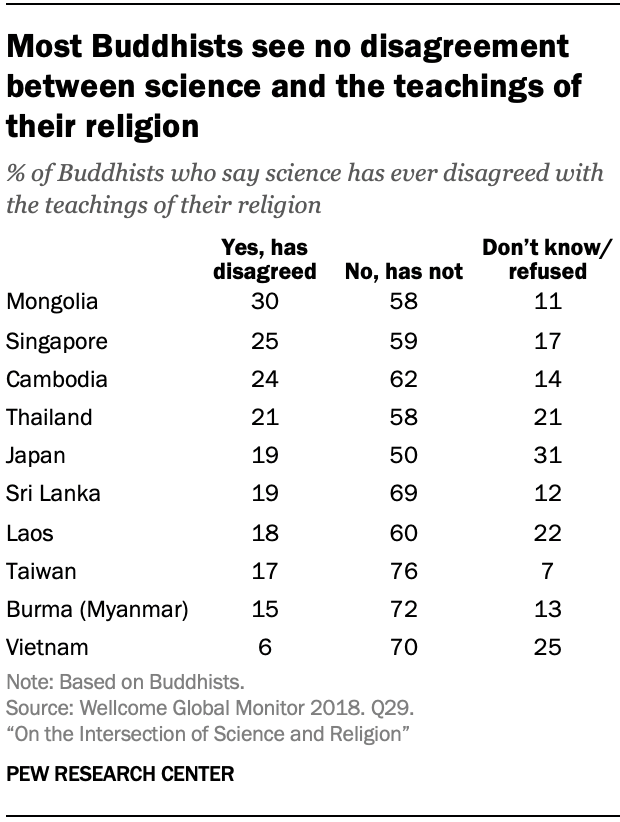
The tenor of these comments is consistent with survey findings from the 2018 Wellcome Global Monitor. Majorities of Buddhists in all 10 countries with large enough samples for analysis said that science has "never disagreed" with the teachings of their religion.3 This includes 59% of Buddhists in Singapore. (In Malaysia, 55% of Buddhists said the same. However, these results should be interpreted with extra caution because there were just 129 Malaysian Buddhists in the survey sample.) Far smaller shares of Buddhists in these countries see a conflict between science and their religion's teachings.
Surveys among Christians find wide variation in perceptions of conflict between religion and science though more see at least some conflict than do not
For comparison, representative surveys of Christians around the world also find widely ranging views about whether religion and science have ever disagreed or are generally in conflict. The 2018 Wellcome Global Monitor survey finds wide variation in Christians' views on this issue.4 The U.S. stands out, along with several southern European nations, for its relatively high share of Christians reporting that science has disagreed with the teachings of their religion (61%). By contrast, 22% in Singapore, 18% in Sweden and 12% in the Czech Republic say the same.

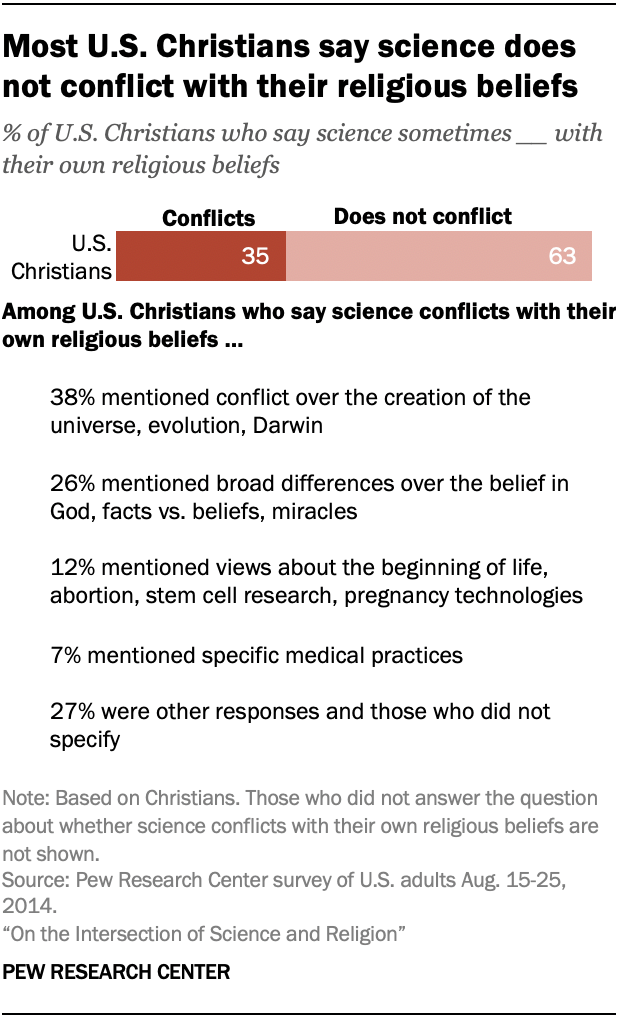
Pew Research Center surveys asked a similar question in Central and Eastern Europe as well as in Latin America. Christians in these regions tilt toward saying that "there is generally a conflict between science and religion." A median of 49% of Christians in Central and Eastern Europe say there is generally a conflict, and a median of 39% say there is not. The median view on this question in Latin American was similar (50% to 40%).

In a U.S.-based Pew Research Center survey, a majority of Christians (55%) said that science and religion are "often in conflict" when thinking in general terms about religion. When thinking about their own religious beliefs, however, fewer Christians (35%) said their personal religious beliefs sometimes conflict with science; a majority of U.S. Christians (63%) said the two do not conflict.
Such findings broadly align with Elaine Howard Ecklund and Christopher P. Scheitle's analysis in "Religion vs. Science: What Religious People Really Think," which finds that many U.S. Christians see little conflict between science and their faith.
This survey also provides a window into the kinds of things that Christians see as a conflict between science and religion. In an open-ended question included on the Center's survey, respondents who said science conflicted with their personal religious beliefs were asked to identify up to three areas of conflict. Christians most commonly mentioned the creation of the universe, including evolution and the "Big Bang" (cited by 38% of U.S. Christians who saw a conflict between science and their religious beliefs). Respondents also mentioned broad tensions including the idea that man (rather than God) is "in charge," beliefs in miracles, or a belief in the events of the Bible (26%). Others cited conflict over the beginning of life, abortion, and scientific technologies involving human embryos (12%) or other medical practices (7%).

Evolution is a more frequent point of conflict for those in Abrahamic faiths such as Islam and Christianity
Evolution raised areas of disagreement for many Muslim interviewees, who often said the theory of evolution is incompatible with the Islamic tenet that humans were created by Allah. Evolution is also a common, though by no means universal, friction point for Christians. By contrast, neither Buddhist interviewees, followers of a religion with no creator figure, nor Hindu interviewees, followers of a polytheistic faith, described discord with evolution either in their personal beliefs or in their views of how evolution comports with their religion.
Some Muslims interviewees see origination of humans from the prophet Nabi Adam as at odds with evolution
When asked about the theory of evolution, Muslim interviewees generally talked about conflict between the theory of evolution and their religious beliefs about the origins of human life – specifically, the belief that God created humans in their present form, and that all humans are descended from Adam and Eve. "This is one of the conflicts between religion and Western theory. Based on Western theory, they said we came from monkeys. For me, if we evolved from monkeys, where could we get the stories of [the prophet] Nabi? Was Nabi Muhammad like a monkey in the past? For me, he was human. Allah had created perfect humans, not from monkey to human," said one Muslim man (age 21, Malaysia).
Islamic views on evolution
"Nonsense. I believe that Nabi Adam is the first human in the world. Before Nabi Adam was created, other living things such as dinosaurs and so on were also created. The theory of human evolution from apes to human is very different from the teaching in Islam."
– Muslim man, age 24, Malaysia
"That theory to me is absurd. People might be saying that during time of Mesopotamia, the people there hunch and bow, with appearance looking like an ape. Maybe that is why one says we come from apes. But, for me, I believe that we come from Adam and Adam came from heaven."
– Muslim woman, age 36, Malaysia
"Our ancestors are not monkeys. Maybe there's similarity in the DNA, but in Islam the first human is Adam. He's not a monkey."
– Muslim man, age 35, Singapore
Others emphasized that evolution is only a theory and has not been proven true. "It's just a theory, because there is no specific evidence or justification. … Just because the DNA [of humans and primates] has a difference of a few percent, that doesn't mean we are similar," said a 29-year-old Singaporean Muslim man. Still others said that Charles Darwin developed this theory in order to get famous and did not put adequate thought or research into his theory.
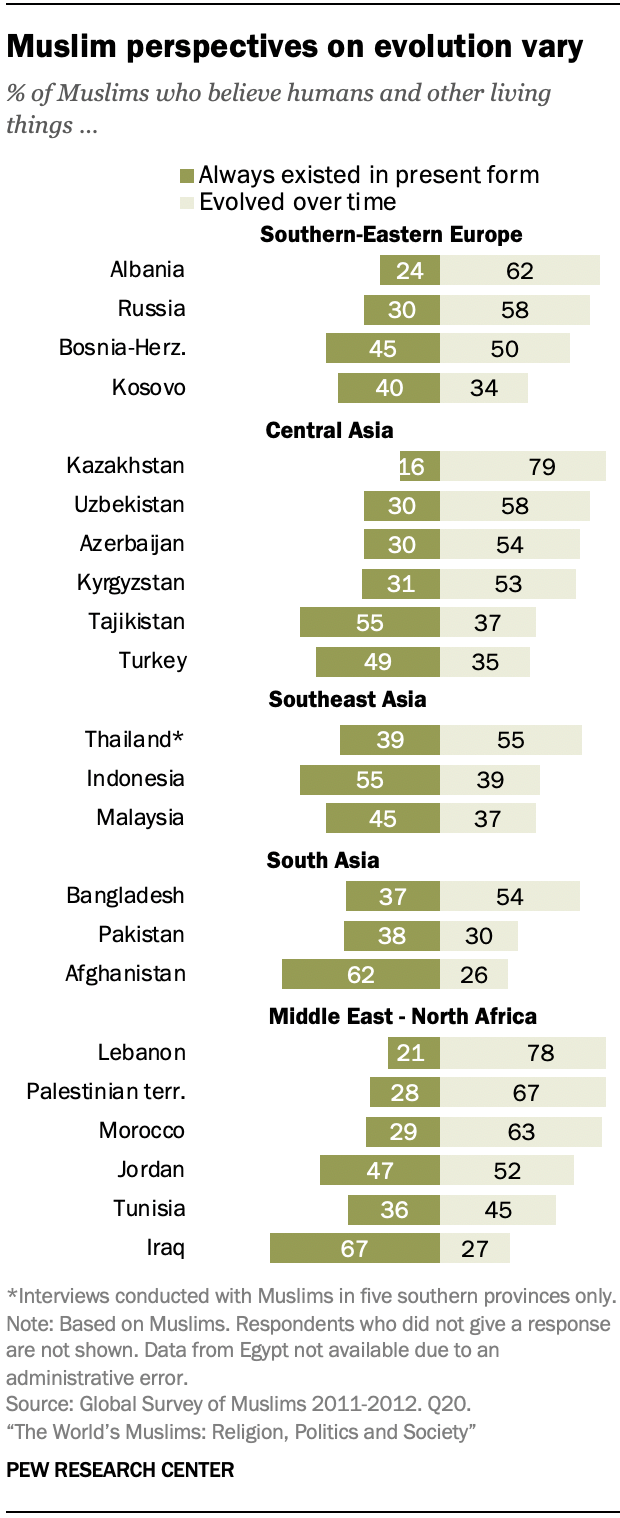
However, a handful of Muslims said they personally believed that humans were descended from primates via the evolutionary process, even though they believed that this deviated from Islamic teaching. "Monkeys can crawl. After that, stand, stand, stand, then become human, right? Yes, I think so. I think, yeah, that one I believe. … [But] religion says all humans in the world come from God. A bit of conflict," said a 44-year-old Muslim woman from Singapore. Another Muslim woman (age 39, Singapore) said she was open to the concept of evolution, even though her religion tells a different story. "According to religion, we don't originate from monkeys. But being that we may be related, the possibility is there," she said.
A Pew Research Center survey of Muslims worldwide conducted in 2011 and 2012 found a 22-public median of 53% said they believed humans and other living things evolved over time. However, levels of acceptance of evolution varied by region and country, with Muslims in South and Southeast Asian countries reporting lower levels of belief in evolution by this measure than Muslims in other regions. In Malaysia, for instance, 37% of Muslim adults said they believed humans and other living things evolved over time.
In the U.S. context, a 2011 Pew Research Center survey found that views of evolution among American Muslims were roughly split: 45% said they believed humans and other living things have evolved over time, while 44% said they have existed in their present form since the beginning of time.
In Hinduism we have something like this as well, that tells us we originated from different species, which is why we also believe in reincarnation, and how certain deities take different forms. This is why certain animals are seen as sacred animals, because it's one of the forms that this particular deity had taken.
— Hindu woman, 29, Singapore
Hindu and Buddhist interviewees emphasize the absence of conflict with the theory of evolution
Evolution posed no conflict to the Hindus interviewed. In keeping with thematic comments that Hinduism contains elements of science, many interviewees said the concept of evolution was encompassed in their religious teachings. "In Hinduism we have something like this as well, that tells us we originated from different species, which is why we also believe in reincarnation, and how certain deities take different forms. This is why certain animals are seen as sacred animals, because it's one of the forms that this particular deity had taken," said a 29-year-old Hindu woman in Singapore. When asked about the origins of human life, many Hindu interviewees just quickly replied that humans came from primates.

The Buddhists interviewed also tended to say there was no conflict between their religion and evolution, and that they personally believed in the theory. Some added that they didn't think their religion addressed humans' origins at all. "I don't think Buddhism has any theory on the first human being or anything. For Buddhism, we don't really have a strong sense of how the first human came along," said a Buddhist man in Singapore (age 22).
Hindu views on evolution
"I don't think evolution has anything to do with religion, nothing to do with Hinduism. That was just adaptation. For example, apes to men. It was just adaptation that people eventually changed over time."
– Hindu man, age 26, Singapore
"The concept (of evolution) is the same. The Hindus say it in a different way, and modern science says it in a scientific way."
– Hindu woman, age 27, Malaysia
Buddhist views on evolution
"[Buddhism says] we are all made out of the atoms and molecules, not that we are created by God. Like Christians believe that we are created by God, but no, I as a practicing Buddhist do not believe in that."
– Buddhist woman, age 60, Malaysia
There is limited global survey data on this issue. However, Pew Research Center's 2014 Religious Landscape Study found that 86% of Buddhists and 80% of Hindus in the U.S. said that humans and other living things have evolved over time, with majorities also saying this was due to natural processes.
Surveys of Christians globally find that majorities in most publics surveyed accept the idea that humans and other living things have evolved over time
Pew Research Center surveys conducted in Central and Eastern Europe and Latin America find that a majority of Christians in most countries in these regions say humans and other living things have evolved over time. An 18-country median of 61% of Christians say this in Central and Eastern Europe, while a median of 30% say instead that humans and other living things have existed in their present form since the beginning of time. The median views on this issue are similar in Latin America (59% and 35%, respectively).

Views of American Christians are about the same as those global medians: 58% in a 2018 Pew Research Center survey said that humans and other living things have evolved over time, while 42% said they have always existed in their current form.
People's responses to questions about evolution can vary depending on how the question is asked, however. Specifically, a 2018 Pew Research Center survey focusing on beliefs about the origins of humans found more white evangelical Protestants, Black Protestants and Catholics expressed a belief in evolution when given the option to say that humans evolved with guidance from God or a higher power.
Such differences in how Christians see the issue of evolution are broadly consistent with an analysis by Fern Elsdon-Baker and her research completed with colleagues in the UK and Canada, which suggest that people's views on evolution can be nuanced, depending on the exact questions asked.

Interviewees across Muslim, Hindu and Buddhist groups cite tension with research that "goes against nature" or involves harm to animals
Two areas of potential conflict with science cut across religious groups. Interviewees from all three groups raised concerns about scientific research that interferes with nature in some way or that causes harm to animals.
Views on animal welfare and scientific research
"When we do scientific research, we just have to ensure we did not endanger other living things, including animals and humans. We don't bring harm to any of the people, that is the basic moral value."
– Hindu man, age 22, Malaysia
"In Islam, for example, you shouldn't subject any human or animals to cruelty. So, I believe if you want to do any testing on rats, you need to ask yourself: "Will the rats suffer?'"
– Muslim man, age 59, Singapore
In discussing scientific research using gene editing, cloning and reproductive technologies such as in vitro fertilization, Muslim, Hindu and Buddhist interviewees raised the idea that such practices may go against the natural order or interfere with nature. As one Buddhist man simply put it: "If you have anything that interferes with the law of nature, you will have conflict. If you leave nature alone, you will have no conflict" (age 64, Singapore). Similarly, a Muslim woman said "anything that disrupts or changes the natural state" goes against religious beliefs (age 20, Singapore).
When probed about potential areas of scientific research that should be "off limits" from a religious perspective, individuals from all three religious groups talked about the need to consider animal welfare (and sometimes human welfare) in scientific research. This idea occasionally came up when interviewees were asked for their thoughts about cloning and gene editing; others mentioned animal welfare concerns at other points of the interview, along with the need for ethical treatment of living things in general. Buddhists and Hindus in particular emphasized the need to "do no harm" when probed about characteristics that make someone a good follower of their religions.
When we do scientific research, we just have to ensure we did not endanger other living things, including animals and humans. We don't bring harm to any of the people, that is the basic moral value.
— Hindu man, 22, Malaysia
A few interviewees thought one other topic should be off limits to scientific exploration: research aimed at core beliefs such as the existence of God, the heavens or holy scripture.

Touchpoints between religion and biotechnology research areas
Interviewees were asked to talk about their awareness of and views about each of three specific research areas in biotechnology – new technologies to help women get pregnant, gene editing for babies, and animal cloning. People had generally positive views of pregnancy technology such as in vitro fertilization, although Muslim interviewees pointed out potential objections depending on how these techniques are used. Views of gene editing and cloning were more wide-ranging, with no particular patterns associated with the religious affiliation of the interviewees.
Individuals from all three religions generally approved of pregnancy technology and in vitro fertilization
The first scientific development raised for discussion involved technologies to help women get pregnant. Interviewees often volunteered that they were familiar with in vitro fertilization, commonly referred to as IVF, which is an assisted reproductive technology. Individuals who expressed positive views about IVF mentioned things pertaining to the help it brings to people trying to conceive in modern times. Some even surmised that IVF itself or the knowledge to develop it was a gift from God.
Buddhists and Hindus on IVF
"I don't think my religion would have any comments on [IVF and surrogacy]. I think Christians would have more comments on it. Like the very staunch Christians, they think that they can't do this and that. They are very specific."
– Buddhist woman, age 26, Singapore
"It's a good thing. Some couples don't have the chance to get babies. With these technologies, people are finding happiness."
– Hindu man, age 24, Malaysia
Muslims accept pregnancy technologies, with conditions
"You cannot use another person to carry your baby, but people want their own flesh-and-blood baby. So, [IVF] is a really good opportunity. Because otherwise people usually just adopt, and it's not their flesh and blood. They don't want that."
– Muslim woman, age 24, Singapore
"In my opinion, IVF does not have any conflict with the religion because it helps to continue the descendants and it involves the correct and qualified person. … The man should be the person who is qualified and marry the woman, and the wife should be the person who is qualified to receive the fetus from the man."
– Muslim man, age 24, Malaysia
"For that particular woman to perform this scientific procedure, the company that executes this procedure must make sure that the woman has a certificate of marriage, meaning legitimately married. I think it is that simple. If she is not married, but she wants (to perform this procedure), I don't think the company should do it. It is immoral."
– Muslim man, age 36, Malaysia
Even among supporters of these technologies, one common sentiment was that people were either unsure of where their religion stood on this issue or thought that other people – those who were older, more conservative or more religious – might be against it. "I think the old-timers are having a bit of a difficult time with being OK with [IVF]. The young generation, my generation, and the ones younger are OK with this," said one Hindu man (age 26, Singapore).
Some Hindus and Buddhists noted that they were comfortable with pregnancy technologies themselves, but said that there is pushback from other religions, particularly Islam and Christianity. For instance, when asked about IVF, one Buddhist man said, "Oh, wow, that's a very good question. Controversy, right? I heard about such before, I think, especially coming from Christianity. But, my personal take, I feel it is fine. It's still trying to get the balance of being a believer of a religion vs. overly superstitious or believing too much in that religion that you forgo the reality of life going on" (Singapore, age 37). Another noted that Buddhism and Hinduism don't have the same staunch views on IVF as Muslims. "In Buddhism, we don't have this type of restriction. It's totally different from other [religions], if I'm not wrong. If you talk about Muslims, there is. If you talk about Hindus, I think also they don't," he said (age 43, Singapore).
Muslim interviewees tended to accept technologies to facilitate pregnancy. However, some Muslims emphasized that they would only be OK with these technologies if certain criteria were met – specifically, if the technologies were used by married couples, and with the couples' own genetic material. "IVF is fine with me because it uses the couple's egg and sperm and the mother's body. You need help inseminating the egg, that's all," said one Muslim man (age 59, Singapore). Some Muslims also expressed concern about surrogacy in particular; they said Islam prohibits bringing outside parties into a marriage, and that surrogacy is effectively having a third person enter the marriage. A few other Muslims in the study mentioned the need to consult edicts or talk with leaders in the religious community before they would be able to be fully supportive, a common practice for many controversial issues in Islam.
Opinions varied widely on gene editing and animal cloning
Interviewees, regardless of their religion, said the idea of curing a baby of disease before birth or preventing a disease that a child could develop later in life would be a helpful, acceptable use of gene editing. But they often viewed gene editing for cosmetic reasons much more negatively.
Views on gene editing vary depending on how it is used
"I think science and technology aims to help the people. If you modify the baby, it is not good for them. The baby might also not want what the parents edited. In terms of the treatment of diseases, I think is good, as you can cure the baby."
– Buddhist man, age 23, Malaysia
"I like one half of it, the other half I don't like. The half that I like was eliminating the diseases. The part where you can make the eye color and all that? I wouldn't say I'm against it, but I'm definitely not up for it."
– Hindu woman, age 40, Singapore
Muslims' concerns with "playing God"
"Cloning, to put it simply, you're delving into an area where you're playing God. It is concerning because if it's taken as something that's normal, it means that humans can do things that previously no one could do. That means we could create ourselves. That goes against the beliefs that I have, because as a Muslim, while we have the ability to do certain things, it does not mean that we should do those things."
– Muslim man, age 29, Singapore
Several interviewees brought up the idea of not agreeing with gene editing out of fear that people might want to Westernize their children. For example, some repeated the concern that gene editing would be used to create babies with blond hair and blue eyes. "In terms of the diseases, I think it is acceptable. If they want to change the hair or eyes color? We are not European people," said one Muslim woman (age 47, Malaysia).
Views of cloning were similarly conditional. Individuals from all three religions remarked on their disapproval of cloning for humans. But interviewees generally found animal cloning to be a much more acceptable practice. Many people interviewed envisioned useful outcomes for society from animal cloning, such as providing meat to feed more people, or to help preserve nearly extinct animals. For example, a Hindu woman said, cloning "is a good idea because some of the animals, like tigers, are on the brink of extinction, so I think it is good to clone before they are extinct" (age 27, Malaysia).
Many of the issues raised about gene editing and cloning mirrored each other. Some of the concerns were based on religious traditions and values. For example, primarily Muslim interviewees mentioned that cloning could interfere with the power of God, who should be the only one who can create.
Cloning, to put it simply, you're delving into an area where you're playing God.
— Muslim man, 29, Singapore
To the extent Hindus and Buddhists in the study expressed religious concerns pertaining to gene editing and cloning, they generally brought up the idea that these scientific methods might interfere with karma or reincarnation. (Some interviewees also mentioned the potential of IVF to interfere with karma, but they were generally less concerned about this.) One Buddhist woman, talking about gene editing, said: "Sometimes the person is born with sufferings, and it is because maybe previously he had been doing some evil things" (age 45, Singapore). When asked about cloning, a Hindu man expressed similar views. "For Hinduism, we believe that how we look like, how we are, our hands and our legs, it's because of our past life. So, for example, they will always say that if I am handsome and I'm smart, it's because in my past life I actually was a nicer person to people. Because of karma, because of reincarnation, I was born back into the better person" (Hindu man, age 25, Singapore).
Pew Research Center surveys in the U.S. survey find a strong relationship between levels of religious commitment and views on biotechnology developments, including gene editing. In a 2018 survey, majorities of U.S. Christians, including white evangelicals and other Protestants as well as Catholics, said if the development of gene editing for babies entailed embryonic testing, it would be taking the technology too far. A common finding in Center surveys of Americans on emerging biotechnology issues such as gene editing for babies and animal genetic engineering is that public opinion depends on the use and effects of emergent technologies for society.5

Religious differences fade as interviewees think about the value of government investments in scientific research
Not all aspects of science are seen through a religious lens. Regardless of their religion, the people we spoke with overwhelmingly described investment in scientific research, including medicine, engineering and technology, as worthwhile. Malaysians and Singaporeans alike broadly shared this feeling.
Support for investment in scientific research
"I think it is very, very worth investing because the research is not just gathering information and data, but indirectly it creates job opportunities for the future. These would be very useful for the future and it can directly help a country to develop."
– Muslim man, age 33, Malaysia
"For me, engineering and technology investment is worthwhile because we want to be comparable to other advanced countries."
– Muslim man, age 21, Malaysia
"It's never enough [investment], because the more we do, the better results we'll get. … Maybe one day there would be a cure for cancer in a very easy way. Maybe they will be able to detect mental illnesses through scans. If that is possible through research, it will be a breakthrough for a lot of people."
– Hindu man, age 38, Singapore
On scientific research and national prestige
"If we do something that no other countries have been doing, we can make good money out of it and we can be a pioneer in that field. A lot of Malaysians have been contributing their ideas to other countries, but not to their own country. … So why not we do it for our own country, and get a name for Malaysia, and get famous."
– Hindu woman, age 29, Malaysia
In both countries, interviewees described government investment in science as a way to encourage economic development while also improving the lives of everyday people. People often were particularly enthusiastic about government investment in medicine and spoke of its potential to improve their country's medical infrastructure and care for an aging population.
But others expressed some hesitation about government investment because they felt their government wasn't doing a good job of ensuring that the research produced meaningful results, or because they thought the research didn't benefit the public directly. "If there's results, then it will be worthwhile. … I don't think [there are results] because I've never heard anybody say 'Wow, Singapore has discovered a new drug,'" said one Buddhist woman (Singapore, 26). Some interviewees also said they supported government investment in medical research, but that they thought the private sector could take care of investment in engineering or technology.
Malaysians also mentioned that a sense of national pride or prestige could come from government investment in science and the subsequent achievements. For example, one Buddhist woman (age 29) said research on medicine and technology could help Malaysia "become famous compared with other countries." A Hindu man, 24, said he hoped the government would increase its spending on engineering and technology, because it would provide more jobs and show that Malaysia is a high-achieving country. He said more investment would "[help] a lot of people to achieve their dreams. You are putting Malaysia in the top table." Another Malaysian man expressed a similar sentiment, saying: "For me, engineering and technology investment is worthwhile because we want to be comparable to other advanced countries" (Muslim, age 21).
We appreciate the thoughtful comments and guidance from Sharon Suh, Ajay Verghese and Pew Research Center religion experts including Besheer Mohamed, Neha Sahgal and Director of Religion Research Alan Cooperman on an earlier draft of this essay.
We greatly benefited from Mike Lipka's editorial guidance, graphic design from Bill Webster, and copy editing from Aleksandra Sandstrom.
Source: https://www.pewresearch.org/religion/2020/08/26/on-the-intersection-of-science-and-religion/
0 Response to "Although Modern Societies Have a Strong Emphasis on Science Religion Continues Because Science"
Post a Comment